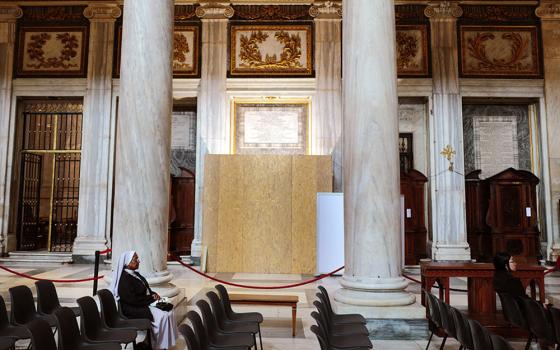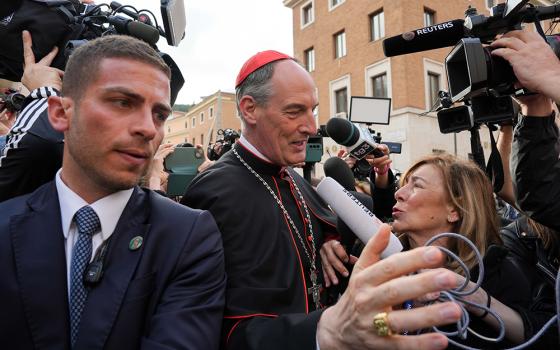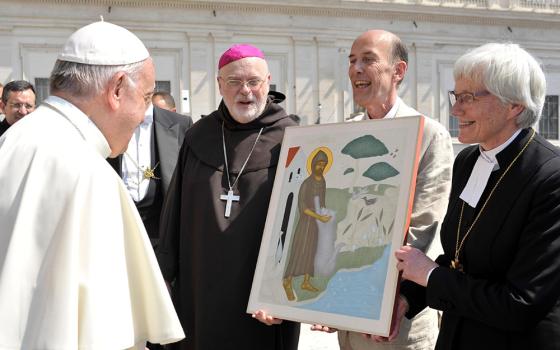
Judge Amy Coney Barrett applauds as President Donald Trump announces her as his nominee to the Supreme Court, in the Rose Garden at the White House, Saturday, Sept. 26, 2020, in Washington. (AP Photo/Alex Brandon)
President Donald Trump’s nominee for the U.S. Supreme Court has close ties to a charismatic Christian religious group that holds men are divinely ordained as the "head” of the family and faith. Former members of the group, called People of Praise, say it teaches that wives must submit to the will of their husbands.
Federal appeals judge Amy Coney Barrett has not commented publicly about her own or her family’s involvement, and a People of Praise spokesman declined to say whether she and her husband are current members.
But Barrett, 48, grew up in New Orleans in a family deeply connected to the organization and as recently as 2017 she served as a trustee at the People of Praise-affiliated Trinity Schools Inc., according to the nonprofit organization’s tax records and other documents reviewed by The Associated Press. Only members of the group serve on the schools’ board, according to the system’s president.
The AP also reviewed 15 years of back issues of the organization’s internal magazine, Vine and Branches, which has published birth announcements, photos and other mentions of Barrett and her husband, Jesse, whose family has been active in the group for four decades. On Friday, all editions of the magazine were removed from the group's website.
People of Praise is a religious community based in charismatic Catholicism, a movement that grew out of the influence of Pentecostalism, which emphasizes a personal relationship with Jesus and can include baptism in the Holy Spirit and speaking in tongues. The group organizes and meets outside the purview of a church and includes people from several Christian denominations, but its members are mostly Roman Catholic.
Advertisement
Barrett’s affiliation with a conservative religious group that elevates the role of men has drawn particular scrutiny given that she would be filling the high court seat held by Justice Ruth Bader Ginsburg, a feminist icon who spent her legal career fighting for women to have full equality. Barrett, by contrast, is being hailed by religious conservatives as an ideological heir to the late Justice Antonin Scalia, a staunch abortion-rights opponent for whom she clerked as a young lawyer.
In accepting Trump’s nomination Saturday, the Catholic mother of seven said she shares Scalia’s judicial philosophy.
“A judge must apply the law as written,” Barrett said. “Judges are not policy makers, and they must be resolute in setting aside any policy views they might hold.”
Barrett’s advocates are trying to frame questions about her involvement in People of Praise as anti-Catholic bigotry ahead of her upcoming Senate nomination hearings.
Asked about People of Praise in a televised interview last week, Vice President Mike Pence responded, “The intolerance expressed during her last confirmation about her Catholic faith I really think was a disservice to the process and a disappointment to millions of Americans.”
But some people familiar with the group and charismatic religious groups like it say Barrett’s involvement should be examined before she receives a lifelong appointment to the highest court in the nation.
“It’s not about the faith,” said Massimo Faggioli, a theology professor at Villanova University, who has studied similar groups. He says a typical feature of charismatic groups is the dynamic of a strong hierarchical leadership, and a strict view of the relationship between women and men.
Several people familiar with People of Praise, including some current members, told the AP that the group has been misunderstood. They call it a Christian fellowship, focused on building community. One member described it as a “family of families,” who commit themselves to each other in mutual support to live together “through thick and thin.”
But the group has also been portrayed by some former members, and in books, blogs and news reports, as hierarchical, authoritarian and controlling, where men dominate their wives, leaders dictate members’ life choices and those who leave are shunned.
The AP interviewed seven current and former members of People of Praise, and reviewed its tax records, websites, missionary blogs and back issues of its magazine to try to paint a fuller picture of an organization that Barrett has been deeply involved in since childhood.
People of Praise was founded in South Bend, Indiana, in 1971 as part of the Catholic Pentecostal movement, a devout reaction to the free love, secular permissiveness and counterculture movements of the 1960s and early ’70s. Many of the group’s early members were drawn from the campus of nearby Notre Dame, a Catholic university.
The group has roughly 1,800 adult members nationwide, with branches and schools in 22 cities across the United States, Canada and the Caribbean. All members are encouraged to continue to attend church at their own parishes.
After a period of religious study and instruction that lasts from three to six years, people involved in People of Praise can choose to make a lifelong covenant pledging love and service to fellow community members and to God, which includes tithing at least 5% of their gross income to support the group’s activities and charitable initiatives, according to a statement on the group’s website.
People of Praise's more than 1,500-word covenant, a copy of which was reviewed by the AP, includes a passage where members promise to follow the teachings and instructions of the group’s pastors, teachers and evangelists.
“We agree to obey the direction of the Holy Spirit manifested in and through these ministries in full harmony with the church," the covenant says.
It’s unclear whether Barrett took the covenant. But members of the organization and descriptions of its hierarchy show that members almost invariably join the covenant after three to six years of religious study or they leave, so it would be very unusual for Barrett to continue to be involved for so many years without having done so.
A 2006 article in the group’s magazine includes a photo of her attending a People of Praise Leaders’ Conference for Women. The magazine also includes regular notices when members are “released from the covenant” and leave the group. The AP's review found no such notice of Barrett's or her husband's departure.
A request to interview Barrett made through the 7th Circuit Court of Appeals in Chicago, where she currently serves as a judge, was declined. The judge didn't mention People of Praise in her 2017 Senate judicial questionnaire, filled out prior to her confirmation for the bench.
Jesse Barrett did not respond to voicemail or email sent through his law firm in South Bend.
People of Praise spokesman Sean Connolly declined to discuss the Barretts or their affiliation with the group.
“Like most religious communities, the People of Praise leaves it up to its members to decide whether to publicly disclose their involvement in our community,” Connolly said by email. “And like most religious communities, we do not publish a membership list.”
Several people familiar with the group told the AP that, unlike some other charismatic movements, People of Praise has a strong commitment to intellectualism, evidenced in part by the schools they have established, which have a reputation for intellectual rigor.
Barrett’s father, Michael Coney Sr., has served as the principal leader of People of Praise’s New Orleans branch and was on the group’s all-male Board of Governors as recently as 2017. Her mother, Linda Coney, has served in the branch as a “handmaid,” a female leader assigned to help guide other women, according to documents reviewed by the AP.
“One of the key principles of People of Praise is freedom, the exercise of our own freedom in following the Lord and in following our own — what we believe, what we think is right,” Michael Coney, 75, said Friday in an interview with the AP.
Joannah Clark, 47, grew up in People of Praise and became a member as an adult. She acknowledged that the board of governors consists of all men, but said that is not a reflection on the “worth or ability of women,” but rather the approach the group has chosen for that level of leadership.
“In a marriage, we look at the husband as the head of the family. And that’s consistent with New Testament teaching,” said Clark, who is the head of Trinity Academy in Portland, Oregon. “This role of the husband as the head of the family is not a position of power or domination. It’s really quite the opposite. It’s a position of care and service and responsibility. Men are looking out for the good and well-being of their families.”
Clark said she had previously served as a “handmaid.” The term was a reference to Jesus’ mother Mary, who called herself “the handmaid of the Lord.” The organization recently changed the terminology to “woman leader” because it had newly negative connotations after Margaret Atwood’s dystopian novel “The Handmaid’s Tale” was turned into a popular television show.
Clark said the woman leaders in People of Praise do things like provide pastoral care and organize help for community members, such as when people are sick or need other help.
“They’re also in a role of advising, so the men will ask the women leaders' advice on issues that affect the patterns of life within the community, certainly issues that affect women and families,” Clark said.
Barrett, in accepting Trump's nomination at the White House on Saturday, put particular emphasis on the equality of her own marriage, saying she expected from the start the she and her husband would run their household as partners.
“As it has turned out, Jesse does far more than his share of the work,” she said. “To my chagrin, I learned at dinner recently that my children consider him to be the better cook.”
Though People of Praise opposes abortion, those familiar with the group said it would be a mistake to pigeonhole their politics as either left or right. While socially conservative in their understanding of family and gender, some members are deeply committed to social justice in matters of race and economics, they said. Barrett’s parents are both registered Democrats, according to Louisiana voter registration records.
Tax records and other documents show that as recently as 2017 Barrett sat on the board of Trinity Schools, a campus of which was recently designated by Education Secretary Betsy DeVos as a National Blue Ribbon School. The schools are coed, but most classes are segregated by gender.
The school’s website says the group sees men and women “created by God equal in dignity but distinct from one another.”
"We seek to uphold both that equality and appropriate distinction in our culture,” it goes on.
Similarly, at People of Praise the leadership structure is largely segregated by gender. And as they become adults, members frequently live together in same-gender communal houses sometimes owned by the group, or they are invited to live with a family within the community. Articles in the People of Praise magazine frequently note when young single members get married to each other. Multiple birth announcements often follow.
The group’s magazine also offers insights into the group's views on marriage, community and members’ finances. A 2007 issue discusses how the 17 single women who live together in a household, called the Sisterhood, had their paychecks direct deposited into a single bank account. One member said she had “no idea” what the amount of her paycheck was.
The pooled money was managed by one woman, who budgeted for everyone’s clothing and other expenses, including $36 weekly per person for food and basics like toilet paper. All women were expected to give 10% of their pay to People of Praise, another 1% to the South Bend branch and additional tithes to their churches.
Married couples and their children also often share multifamily homes or cluster in neighborhoods designated for “city building” by the group’s leaders, where they can easily socialize and walk to each other’s houses.
As part of spiritual meetings, members often relay divine prophecies and are encouraged to pray in tongues, where participants make vocal utterances thought to carry direct teachings and instructions from God. Those utterances are then “interpreted” by senior male leaders and relayed back to the wider group.
A 1969 book by Kevin Ranaghan, a co-founder of People of Praise, dedicates a chapter to praying in tongues, which he describes as a gift from God.
“The gift of tongues is one of the word-gifts, an utterance of the Spirit through man,” Ranaghan wrote in “Catholic Pentecostals.” “Alone, the gift of tongues is used for prayer and praise. Coupled with the gift of interpretation it can edify the unbeliever and strengthen, console, enlighten or move the community of faith.”
In a blog entry on the group's website from March of this year, a mother described taking her children to pray in tongues as the coronavirus pandemic took hold.
While People of Praise portrays itself as a tightknit family of families, former members paint a darker picture of that closeness.
Coral Anika Theill joined People of Praise’s branch in Corvallis, Oregon, in 1979, when she was a 24-year-old mother of 6-month-old twins.
“My husband at the time was very drawn to it because of the structure of the submission of women,” recounted Theill, who is now 65.
Theill, who converted to Catholicism after getting married, said in her People of Praise community women were expected to live in “total submission” not only to their husbands, but also the other male “heads” within the group.
In a book she wrote about her experience, Theill recounts that in People of Praise every consequential personal decision — whether to take a new job, buy a particular model car or choose where to live — went through the hierarchy of male leadership. Members of the group who worked outside the community had to turn over their paystubs to church leaders to confirm they were tithing correctly, she said.
Theill says her “handmaid,” to whom she was supposed to confide her innermost thoughts and emotions, then repeated what she said to the male heads, who would consult her husband on the proper correction.
“There’d be open meetings where you just have to stand for the group and they’d tell you all that was wrong with you,” Theill recounted to the AP last week. “And I would ask questions. I was a critical thinker.”
When she told her husband she wanted to wait to have more children, Theill said, he accompanied her to gynecological appointments to ensure she couldn’t get birth control.
“I was basically treated like a brood mare,” she said, using the term for a female horse used for breeding. During her 20-year marriage, Theill had eight children from 11 pregnancies.
Theill, who says she declined to take the covenant, described being dominated and eventually shunned because of the doubts she expressed about the group.
Clark, a current member in Oregon, said she had never heard of members being shunned.
“At any point, a community member can decide to leave and is free to do so,” Clark said. She said she has friends who have left the community. “These are people I’ve maintained a good friendship with and people who’ve maintained friendships with other people in community.”
But Theill isn’t the only former member to describe forced subjugation of women within People of Praise or shunning of former members.
Among People of Praise’s very first members in South Bend were Adrian Reimers and his wife, Marie. The couple was active for more than a dozen years before he said he became disillusioned and was “dismissed” from the group in the mid-1980s.
Reimers, who teaches philosophy at Notre Dame, went on to write detailed academic examinations of the group’s inner workings and theological underpinnings. In a 1997 book about People of Praise and other covenant communities, Reimers wrote that the fundamental principle of the group was St. Paul’s stipulation from the Bible that the husband is the “head” of his wife and that the wife is to “submit in all things.”
“A married woman is expected always to reflect the fact that she is under her husband’s authority,” Reimers wrote. “This goes beyond an acknowledgment that the husband is ‘head of the home’ or head of the family; he is, in fact, her personal pastoral head. Whatever she does requires at least his tacit approval. He is responsible for her formation and growth in the Christian life.”
Though women are allowed to serve in some administrative roles within the community, Reimers wrote that no woman is allowed to hold a pastoral position of leadership in which she would oversee or instruct men.
“People who leave these communities are often shunned by other members and are spoken of as no longer brothers and sisters in Christ or even no longer Christian,” he wrote.
Reimers declined to expand on his experience with People of Praise, saying he doesn’t know Amy Coney Barrett and didn’t want to get drawn into a political fight. But he said he stands by his prior account.
“To quote Pontius Pilate, ‘What I have written, I have written,’” he said last week, referring to the Roman official in the Bible who signed the order condemning Jesus to be crucified.

This 1979 photo provided by Lisa Williams shows Williams at Bible camp run by People of Praise. (Lisa Williams via AP)
Lisa Williams said her parents joined the Minnesota branch of People of Praise in the late 1970s, when she was a fourth-grader. She chronicled her experience in a blog called “Exorcism and Pound Cake,” a reference to how she knew as a child that it was a meeting night because of the smell of baked goods coming from the kitchen.
“I remember my mother saying a wife could never deny sex to her husband, because it was his right and her duty,” said Williams, 56. “Sex is not for pleasure. It’s for as many babies as God chooses to give you. ... Women had to be obedient. They had to be subservient.”
Corporal punishment of children was common, Williams told the AP. When she was insufficiently obedient to her father, she was beaten with a belt and then required to kneel and ask forgiveness from both him and God, she said.
She recalled People of Praise meetings held in her parents' living room where members prayed in tongues to cast out demons from a person writhing on the floor, rituals she described as exorcisms.
When her parents, from whom she is now estranged, decided to leave People of Praise when she was a junior in high school, she remembers the leaders said her family would be doomed to hell and they were shunned. “Nobody would talk to you,” she recalled.
Steven Hassan, a mental health counselor who works with people who have left fundamentalist authoritarian religious groups, said the culture within People of Praise as described by Theill and Williams, including the practice of shunning former members, creates fear so that people are dependent and obedient.
“A person who is in one of these groups has to suppress their own thoughts, feelings, desires that doesn’t align with the dogma,” Hassan said.
He cautioned, however, that Theill’s and Williams’ experiences were from decades ago and not necessarily illustrative of how the group now operates. And current members of People of Praise interviewed by the AP strongly disputed those characterizations.
“There’s a high value on personal freedom," said Clark, the Trinity School director in Oregon.
She said she had never heard of some of the practices the former members detailed to the AP, such as micromanaging finances or handing over paychecks. She grew emotional when she recounted the sacrifices people in the group make for each other as part of their covenant, like the case of a man known for helping his fellow members move, who was in turn cared for by group members as he died.
“I’ve never been asked to do anything against my own free will,” said Clark, a member of the group for 25 years. “I have never been dominated or controlled by a man.”
Thomas Csordas, an anthropology professor at University of California San Diego, has studied the religious movement that includes People of Praise. He said such communities are conservative, authoritarian, hierarchical and patriarchal.
But, he said, in his view, the group’s leaders are unlikely to exert influence over Barrett’s judicial decisions.
Coney, Barrett’s father, said the culture of female submission described by some former members was based on misunderstandings of the group’s teachings.
“I can’t comment on why they believe that. But it is certainly not a correct interpretation of our life,” he said. “We’re people who love each other and support each other in their Christian life, trying to follow the Lord.”
As a lawyer himself, he rejected the notion that his daughter’s religious beliefs will unduly influence her opinions if she is confirmed to the high court.
“I think she’s a super lawyer and she will apply the law as opposed to any of her beliefs,” he said. “She will follow the law.”






